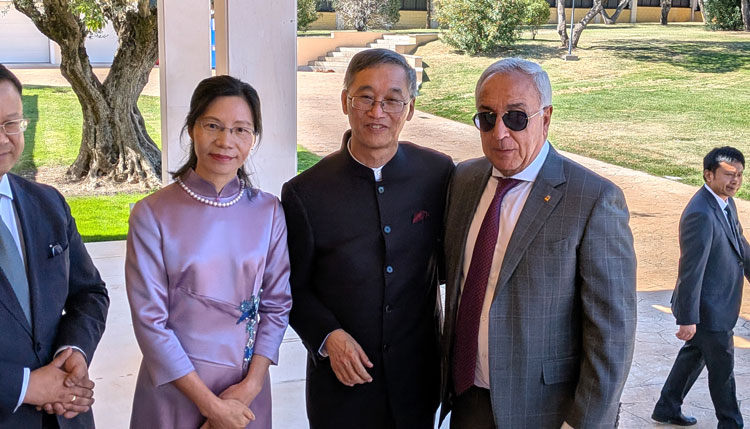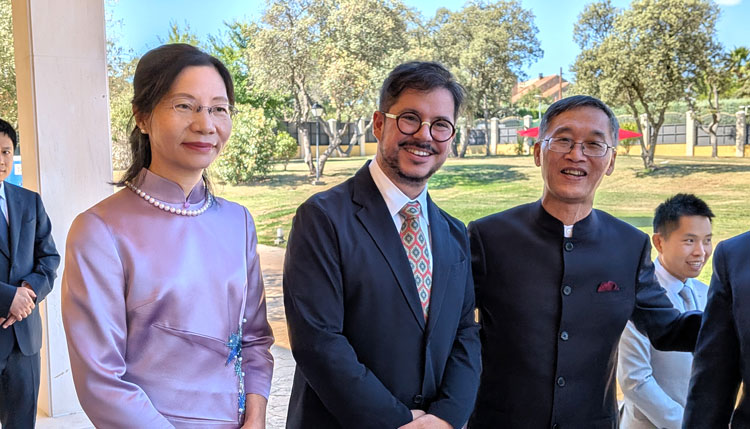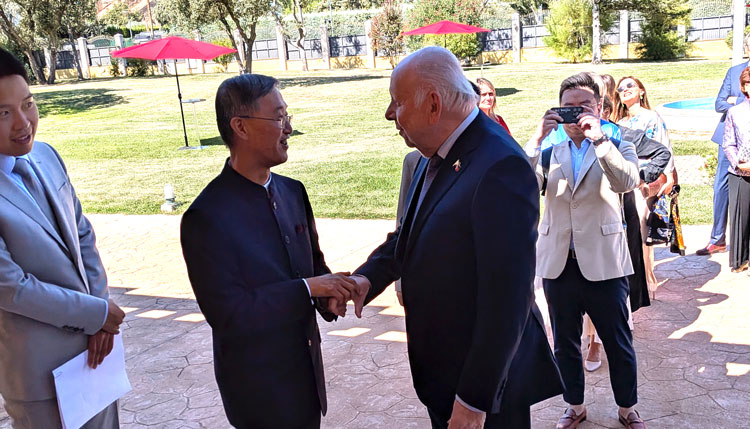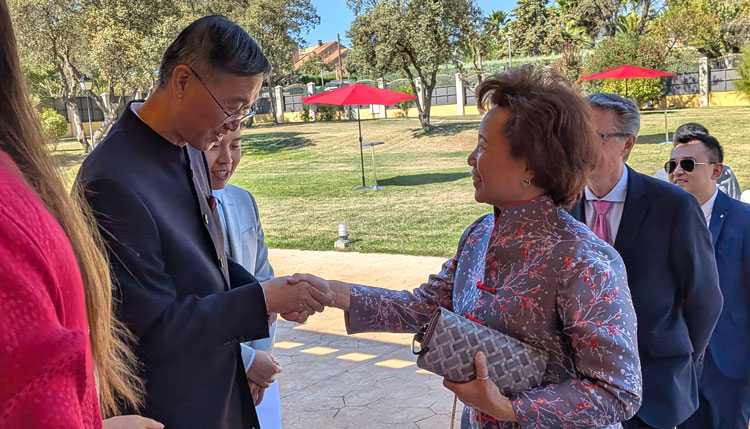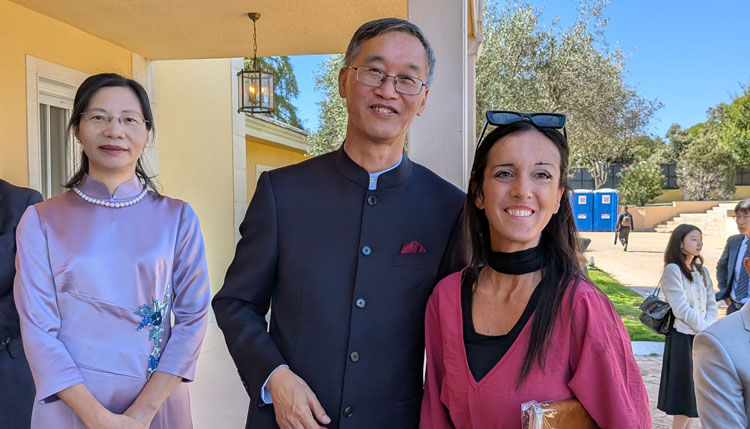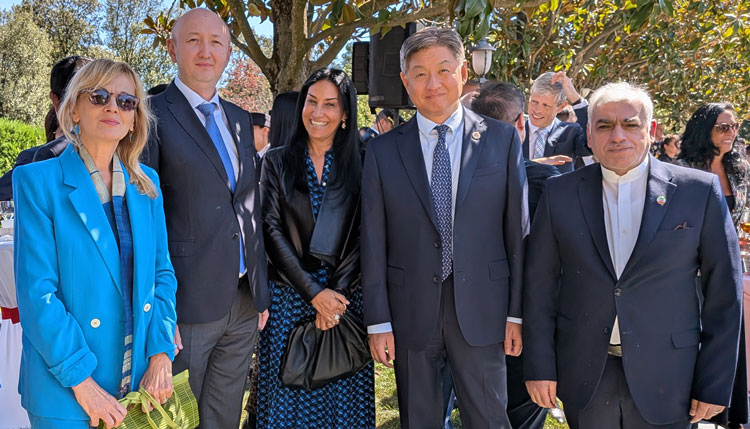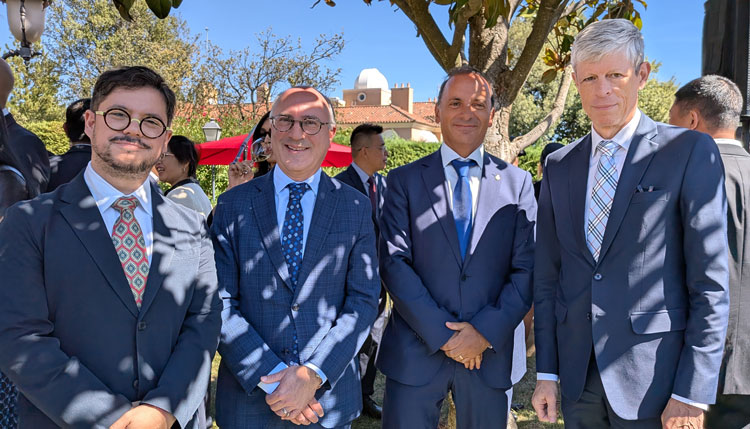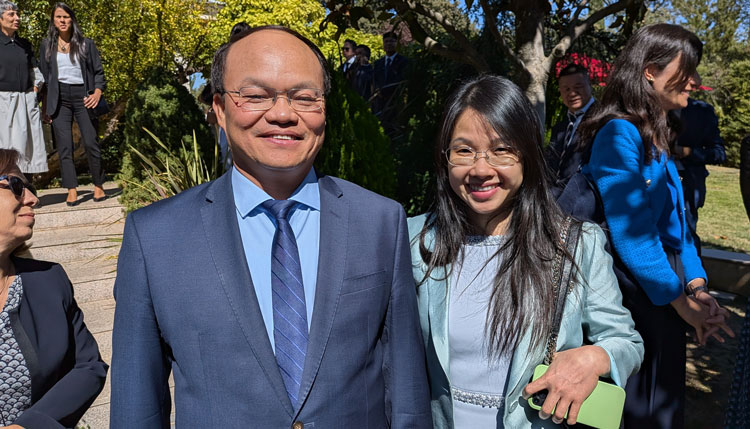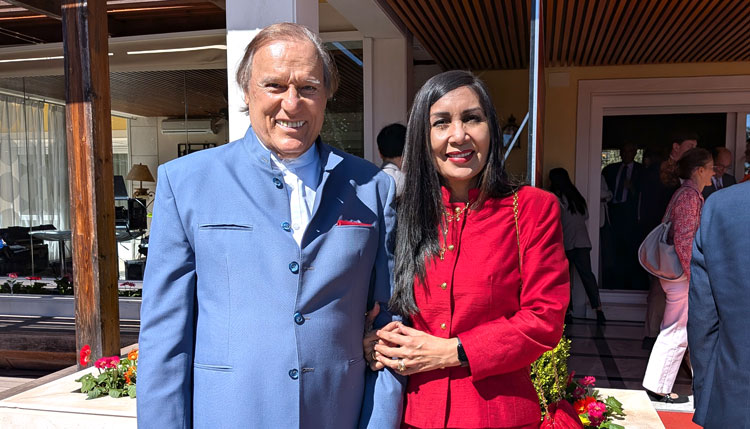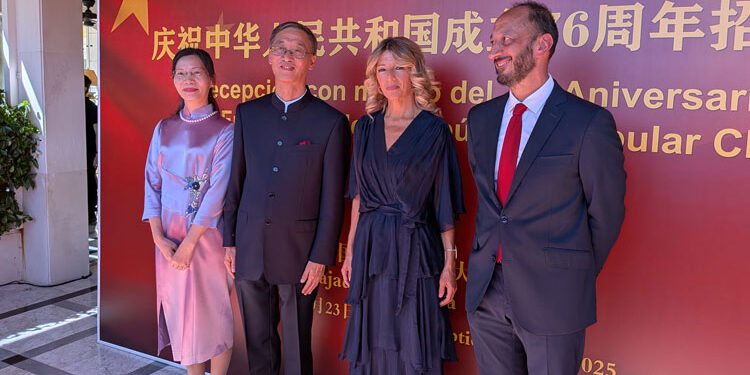Text and photos: Juan David Latorre
On Tuesday, September 23, the Chinese Embassy celebrated the 76th National Day of the Foundation of the People’s Republic of China, an event that took place in the gardens of the residence of the ambassador, Yao Jing.
After welcoming the authorities, diplomats, businessmen and members of the Chinese community to the event, Ambassador Yao Jing thanked “all the people in the world who care and support the friendship between China and the West”.
The ambassador began his speech by saying that “we are committed to building a prosperous society for people, eradicating poverty and contributing more than 30% to the world economy over the years. We stand firm on the path of peaceful development. The President of the People’s Republic of China has proposed the development of global security, the establishment of civilization, the establishment of governance and the construction of the People’s Republic of China. The aim is to promote world peace and human coexistence. We commit ourselves to the important track record achieved by the leaders of the five nations and to strengthening the high-level network to strengthen political confidence. We are ready to deepen and cooperate with the West, expand cooperation on trade, investment, green energy, digital economy and other priorities, boost employment and provide greater well-being for the peoples of both countries”.
“The Chinese government, continued Yao Jing, attaches great importance to relations with Spain, and the Chinese people value their friendship with the Spanish people. This year marks the 20th anniversary of the establishment of the Integral Strategic Partnership between China and Spain. We are ready to work with Spain to further materialize the important objectives achieved by the leaders of both countries during the visit of the Chinese Prime Minister, intensifying high-level exchanges and strengthening mutual strategic trust. We are ready to further deepen and cooperate with Spain, expand cooperation in priority areas such as economy and trade, green energy and the digital economy, boost employment and bring greater well-being to the peoples of both countries.”
The Chinese ambassador concluded his speech by underlining his country’s willingness “to work with Spain to jointly defend international equity and justice, strengthen multilateralism and contribute positively to global peace and development”.
The Second Vice President and Minister of Labour and Social Economy of the Spanish Government, Yolanda Díaz, then took the floor, beginning her remarks by pointing out that “more than 230,000 people of Chinese origin are part of our society. It is one of the largest immigrant communities in our country. It is the fourth largest in Europe. Their entrepreneurial spirit is present in every neighbourhood of our country, in restaurants, shops, family businesses”.
“That human network together with the institutional effort, said the vice president, is the best guarantee of future. A relationship that is built day by day and reminds us that Spain and China have much more in common than it sometimes seems. If we look at the economy, China shows us lessons of enormous topicality. Your country, dear ambassador, is an example of how an ambitious industrial policy with a determined and sustained public involvement over time changes the fate of a country. The Made in China Plan of 25 marked a turning point for his country and should serve as an inspiration to the rest of the world. You bet on transforming manufacturing into technological innovation, in sectors like robotics, such as electric vehicles or new materials or biopharmaceuticals.”
“This plan leaves us with three clear lessons. First, the importance of planning public intervention from public administrations that is strong and coordinated across different administrations, between companies, academia, and universities, precisely to boost strategic sectors. Second, the commitment to technological autonomy. China has become a mirror in which we look at ourselves. And in the 21st century, let me tell you that technology is power. Whoever controls innovation also controls the economy, information, and, to a large extent, the sovereignty of our states. Technological autonomy is not only an economic issue; it is also a democratic issue. Without our own capacity in key sectors, such as those we have mentioned, our countries are exposed to the light or subordinated to decisions made outside our sovereignty. Third, massive and sustained investment in innovation and industrial modernization. This is the key to the present, not the future, to the present of our societies. China has demonstrated that well-directed public investment is not an expense, as we often hear; on the contrary, it is the condition for progress. Such And as the International Monetary Fund itself calculates in a very recent report, the various public instruments of industrial policy in China account for 4.4% of GDP, three times what is allocated in the European Union. These are not data, they are public policies that should make us think. You know that the Draghi Report stated for Europe that only with sustained investment in digitalization, the green transition, and innovation can we guarantee autonomy, competitiveness, and—allow me to tell you as Minister of Labor—a good life for our citizens. Because the challenge remains reducing inequality in our countries. You are well aware that last week, Professor Draghi himself pointed out and denounced the slow pace of the implementation of the public investments he referred to in his report.”
“Spain and China have great potential for cooperation in this area. I think we all have it. The ambassador has said it: in clean energy, in biomedicine, it’s the key, in the digital transition, in agri-food, so important for both countries, where I am convinced we can grow together. But as you know, economics and geopolitics today go hand in hand; they are inseparable. We need strong, horizontal alliances. First of all, in terms of trade, Spain and China have important commercial ties, and this year, new protocols were signed to consolidate these relations based on the principles of balance, reciprocity, and transparency, specifically in the exchange of healthcare and agricultural products,” said Yolanda Díaz.
“But we live in complex times,” he continued, “and it is important to strengthen relations between our countries beyond trade. All of you here know this perfectly well: we are experiencing wars, violations of international law, threats to global security, and a climate crisis that is shaping our common destiny. We cannot forget that the values of the United Nations Charter were born from the sacrifice of the peoples who defeated the Nazi-fascist axis and Japanese militarism; we cannot forget that. Today, we have a democratic obligation to defend that international law in the face of the barbarity we see in Gaza and so many other parts of the world. Today, in the Council of Ministers, we approved the Royal Decree for the legal embargo of all arms with Israel. We are the first country in the world to do so. It is the first step toward dismantling the economy of genocide and telling companies that if the killing does not stop, economic interests will not be welcome in our country. This is not the end of any path. As long as the genocide continues, we will continue to take daily steps to defend international law, life, and peace.” The People’s Republic of China and Spain share that commitment.”
The Spanish Vice President and Minister of Labor and Social Security concluded by emphasizing that “we want the relationship with China to be an example of how we can build on our strengths in a time of too many barriers. Culture is also an essential part of this. Spain and China share traditions, creativity, and a rich heritage that connects with and mutually enriches us. Therefore, the challenge is not only to prosper; the challenge is something more: to prosper with social justice. That is Spain’s commitment: to walk with China toward a shared future, based on mutual respect, cooperation, and always friendship.”
Finally, Alfonso Rodríguez Gómez, First Vice President of the Congress of Deputies, spoke, noting: “For us today, China represents a major global economic power, and in these seven decades, it has undergone a powerful transformation. It has gone from the devastation of war and poverty to the current prosperity and strength, and its national and international power has increased significantly, while the quality of life of its people has improved.”
“Spain and China,” Alfonso Rodríguez continued, “share a commitment to dialogue, cooperation, and mutual understanding. We trust that China, as a leading and decisive international player on the global stage, will also transmit its influence, oriented toward understanding and stability, and which can undoubtedly be key to promoting peaceful solutions. Peaceful solutions in such terrible scenarios as the genocide in Palestine or the long-running cruel invasion of Ukraine. The pain and death of so many people should remind us every day of the urgency of working together for a more just and secure international order. Firm steps are needed to end so much human suffering.
“The history of the Chinese community here in Spain is also a success story that dates back several centuries. The first records of the arrival of Chinese people to our country date back to the end of the 16th century. It has been in recent decades that Spain has become the main and preferred destination for immigration from China. The Chinese community, as an example, is perfectly integrated and adapted into our social and economic fabric in Spain.” Through sectors as important as the restaurant industry, commerce, and, more recently, as Vice President Yolanda Díaz also pointed out, the technology sector. Together, we are building a better future for future generations and striving to improve the quality of life for our people, stated Alfonso Rodríguez.
“Furthermore,” he concluded, “Chinese investments have already entered into sectors that are vital to our economy, such as industry, transportation, energy, and infrastructure. This is one of the best demonstrations that our bilateral relations are strong, robust, and in a permanent process of commitment and consolidation. This is confirmed by the celebration of the 50th anniversary of our diplomatic relations in 2023 and the signing of the Comprehensive Strategic Agreement between Spain and China this year.”
